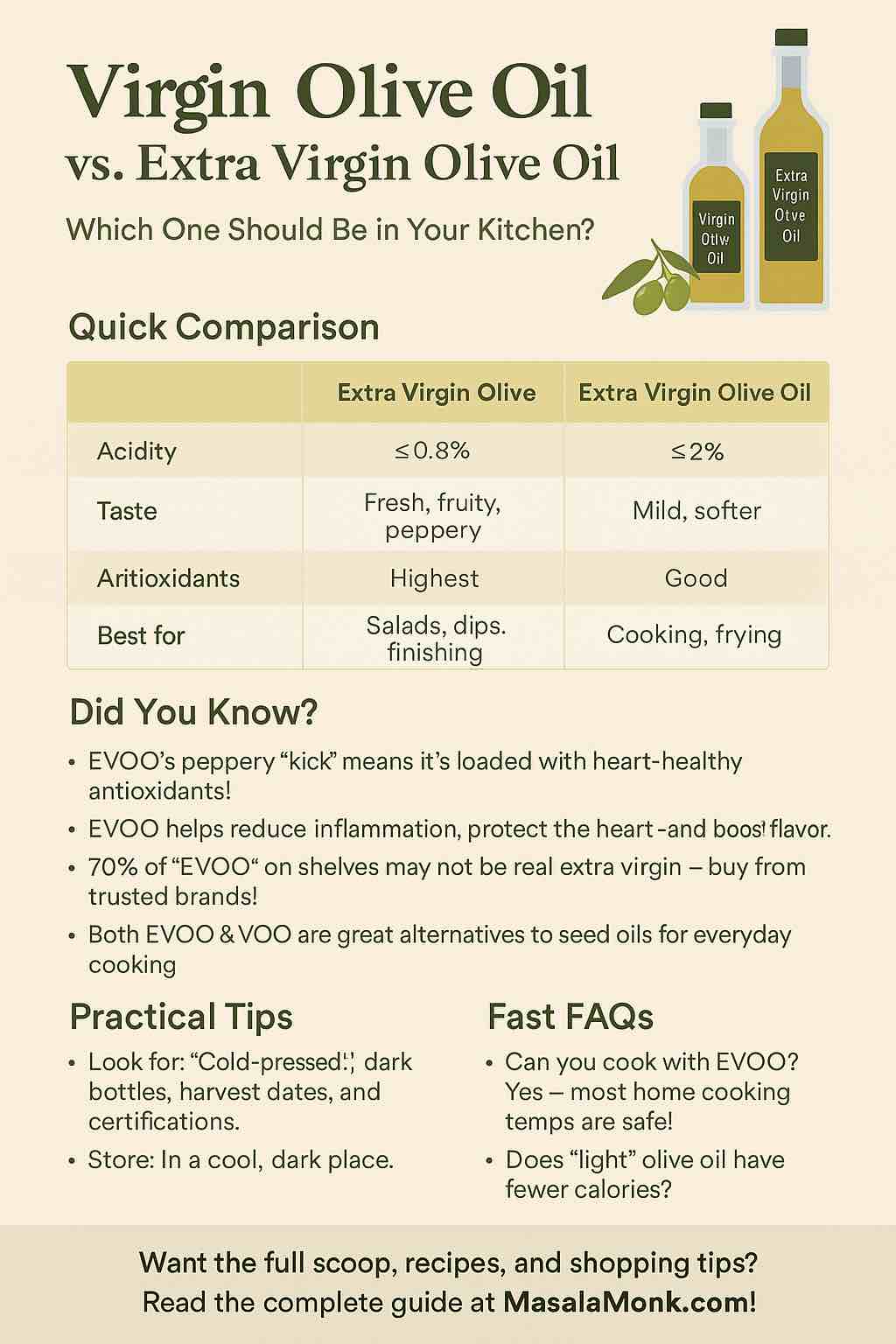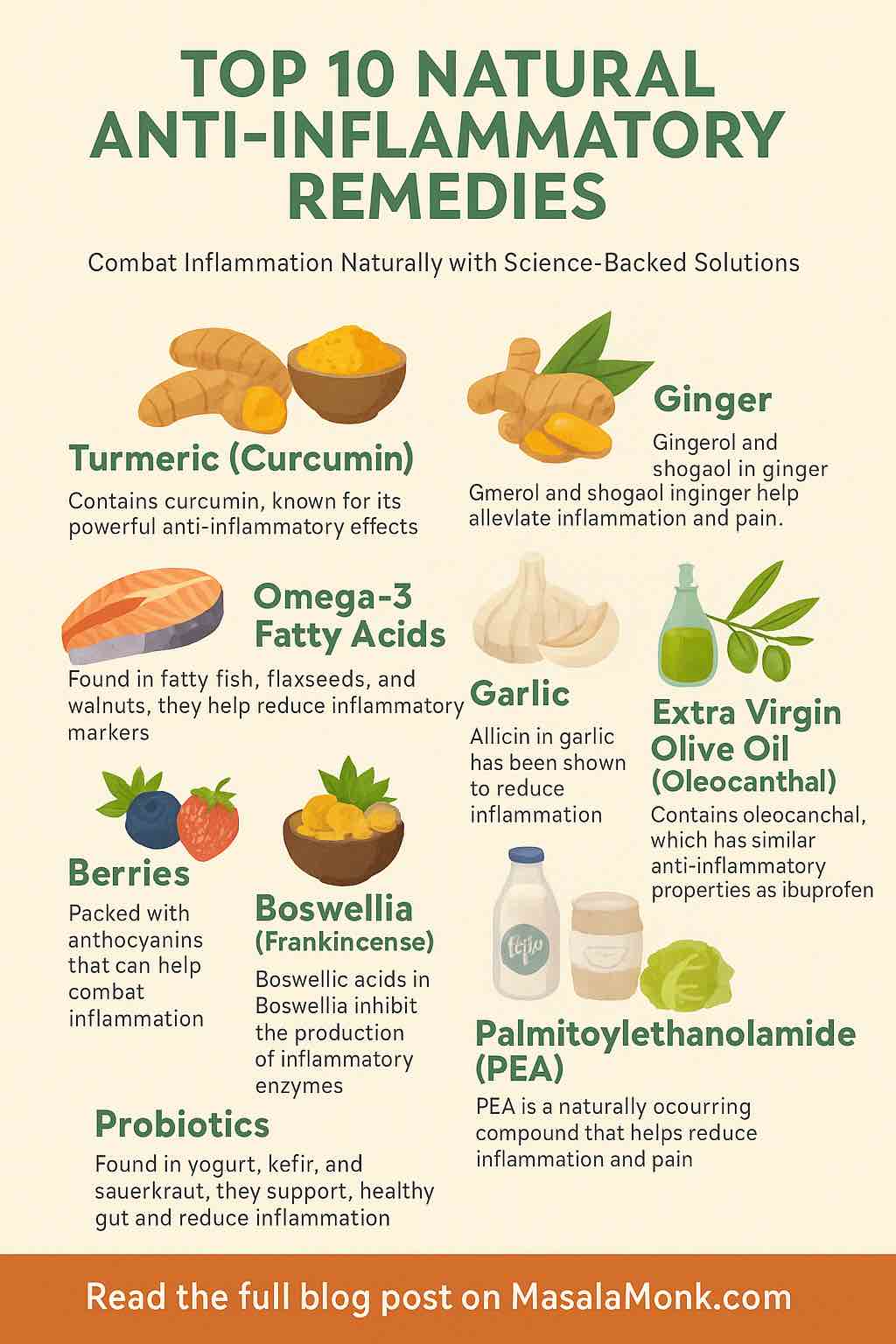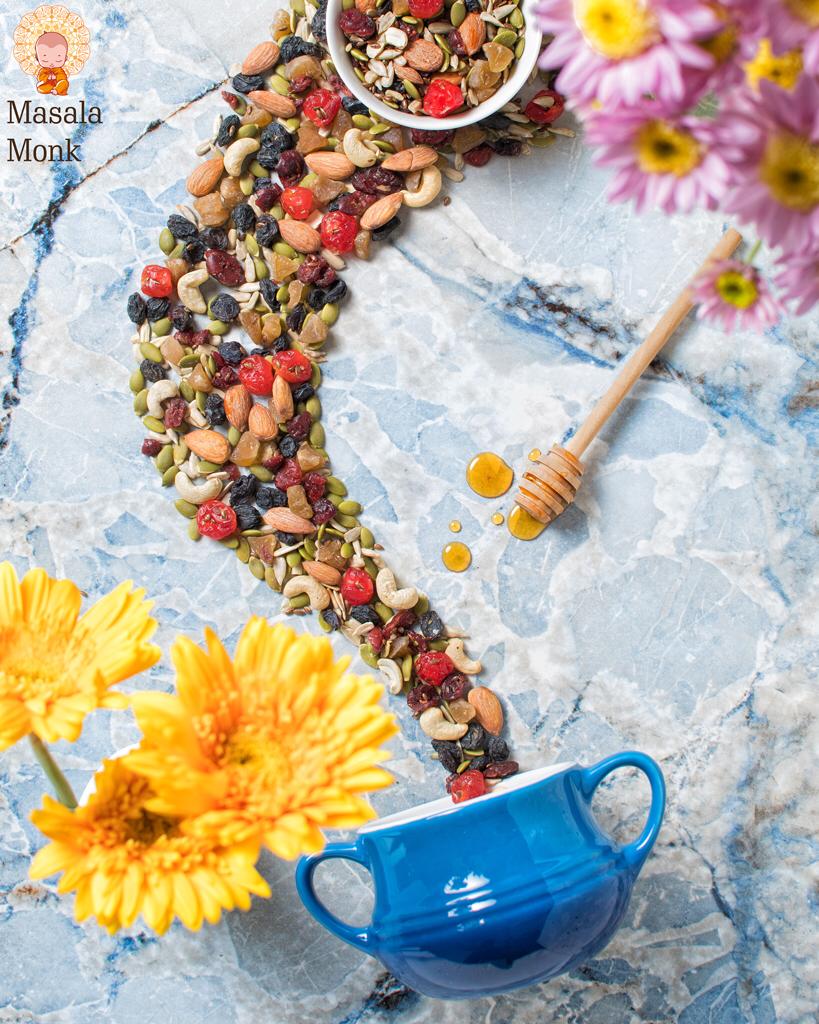
Olive oil is more than just a staple of Mediterranean kitchens; it’s also a global health superstar. But walk down any grocery store aisle, and you’re quickly confronted with a choice: Virgin Olive Oil (VOO) or Extra Virgin Olive Oil (EVOO)?
Is the extra cost of “extra virgin” worth it? Are there real differences in taste, health benefits, or cooking uses? And what does the latest research reveal for your everyday life?
Let’s break it all down in practical, plain English—so you can make smart, delicious, and healthy choices.
1. Quick Definitions
- Extra Virgin Olive Oil (EVOO): The highest grade. Made from fresh olives, cold-pressed, with no chemical processing. Strict quality standards: acidity ≤ 0.8%, no taste defects, rich flavor.
- Virgin Olive Oil (VOO): Also cold-pressed, but allows slight imperfections in flavor and aroma. Acidity ≤ 2%, can have minor defects, milder taste.
2. How Olive Oils Are Made
Both EVOO and VOO are produced mechanically—meaning the oil is extracted from olives without chemicals or excessive heat.
However, the olives used for EVOO must be the freshest and least damaged. Any hint of fermentation, mold, or overripe fruit, and the oil drops to “virgin” or lower status.
3. Quality & Chemical Standards
| Standard | Extra Virgin Olive Oil | Virgin Olive Oil |
|---|---|---|
| Free Acidity (as oleic acid) | ≤ 0.8% | ≤ 2.0% |
| Sensory Defects | None | Slightly allowed |
| Processing | Cold-pressed only | Cold-pressed only |
- EVOO is stringently tested for taste and aroma. Even a hint of “fustiness,” rancid, or winey notes, and it’s downgraded.
- VOO may taste a bit flatter, or have mild off-notes, but is still edible and healthy.
4. Flavor Showdown
- EVOO: Fresh, grassy, fruity, sometimes peppery or bitter. Complex, “alive,” and often has a little “kick” in the throat (a sign of healthy phenols).
- VOO: Softer, less vibrant, may be missing those sharp, peppery notes. Sometimes slightly bland or with minor mustiness.
Tip:
If you love dipping bread, drizzling salads, or finishing dishes with a splash of oil—EVOO is almost always preferred.
5. Nutrition & Health: What Science Says in 2025
Both EVOO and VOO:
- Rich in heart-healthy monounsaturated fats
- Contain vitamins E & K
- Offer some antioxidants
EVOO Goes Further:
- High-polyphenol EVOO (especially “early harvest” or “cold-pressed” varieties) has significantly more antioxidants—mainly hydroxytyrosol, oleacein, and oleocanthal.
- 2025 research shows these compounds:
- Lower inflammation and oxidative stress (potentially reducing risk of heart disease, diabetes, and some cancers)
- Improve vascular function
- May reduce pain and mimic effects of ibuprofen
Recent Study Highlights:
- June 2025 (Nutrients): Regular EVOO intake lowers risk of cardiovascular events, improves endothelial health, and may help prevent recurrence of heart issues.
- 2025 animal studies: High-polyphenol EVOO best protects against cholesterol, inflammation, and mitochondrial stress (even more than regular EVOO or VOO).
- Regulatory note: Some claims (like “EVOO raises HDL”) are still under review by the European Food Safety Authority.
6. Cooking: Which Oil for What?
EVOO:
- Smoke point: ~375–410°F (190–210°C)
- Best for: Salads, finishing, drizzling, bread dipping, gentle sautéing
- Can be used for: Most home cooking—even frying, as recent studies show EVOO is more stable than once believed (thanks to antioxidants)
- Not best for: Prolonged, high-temp deep frying (though still better than many “neutral” oils)
VOO:
- Slightly higher smoke point (~420°F/215°C)
- Best for: Roasting, frying, or recipes where subtlety is OK
- Flavor is milder, making it good for dishes where you don’t want olive oil to steal the show
7. Smart Shopping & Storage
How to Buy Great EVOO:
- Look for “cold-pressed” and “early harvest” or “high-polyphenol” on the label.
- Check the harvest or best-by date: Fresher is better! Ideally, buy oil less than 18 months from harvest.
- Dark glass bottle (protects from light).
- Taste before you commit: Peppery “throat hit” and bitterness mean healthy phenols.
Storage Tips:
- Keep away from heat and light. Cupboard, not next to the stove!
- Seal tightly after each use.
- Use within 2–3 months of opening for peak freshness.
8. Common Myths & Buyer Beware
Myths:
- EVOO isn’t for cooking: False. It’s great for most home cooking and doesn’t become “toxic” at moderate heat.
- All EVOO is the same: False. Quality varies hugely between brands and regions.
Fraud Alert:
- Studies show a shocking number of “EVOO” bottles on store shelves are blends or even fake.
- Best protection: Buy from reputable brands, specialty stores, or producers who can prove their oil’s origin.
9. Bottom Line: What Should You Use?
- For health and flavor: Choose EVOO—especially high-polyphenol or early-harvest types—for salads, finishing, and everyday cooking.
- For higher-heat or neutral taste: Use VOO or even light olive oil, but know you lose some of the health punch.
- On a budget: Even standard VOO is a heart-healthy upgrade over most seed oils. But a good bottle of EVOO is worth the splurge if you want both taste and maximum benefits.
Final Thought
Great olive oil is more than a fat—it’s a flavor, a health elixir, and a little luxury in everyday life.
The next time you shop, spend a moment with the label. Your salad—and your heart—will thank you.
10 FAQs About Virgin Olive Oil vs. Extra Virgin Olive Oil
1. What is the main difference between virgin olive oil and extra virgin olive oil?
Answer:
Extra virgin olive oil (EVOO) is made from the freshest olives, cold-pressed with no chemical treatment, and must pass strict taste and chemical standards (acidity ≤ 0.8%). Virgin olive oil (VOO) is also cold-pressed but may have slight taste defects and a higher acidity (≤ 2%). EVOO is generally more flavorful and has higher antioxidant content.
2. Can I cook and fry with extra virgin olive oil?
Answer:
Yes! EVOO’s smoke point (375–410°F) is suitable for most home cooking, including sautéing and shallow frying. Recent studies show its antioxidants help protect it from breakdown during cooking.
3. Is extra virgin olive oil really healthier than virgin olive oil?
Answer:
EVOO contains more polyphenols (powerful antioxidants) than VOO, giving it a health edge for reducing inflammation, protecting the heart, and possibly lowering chronic disease risk. Both, however, are healthier than refined seed oils.
4. Why does some extra virgin olive oil taste peppery or bitter?
Answer:
That peppery, bitter kick is a sign of high phenolic (antioxidant) content—especially oleocanthal, which is linked to anti-inflammatory effects. This taste means the oil is fresh and packed with beneficial compounds.
5. How should I store olive oil to keep it fresh?
Answer:
Keep olive oil in a cool, dark place (like a cupboard), tightly sealed, and away from heat or sunlight. Use within 2–3 months of opening for best flavor and nutrition.
6. How can I tell if my olive oil is real extra virgin?
Answer:
Look for a harvest or best-by date, dark glass packaging, and certifications (PDO, PGI, COOC). Bitterness and a slight throat burn are good signs. Buying from trusted brands or specialty stores increases your chances of getting authentic EVOO.
7. Are there calories or fat differences between EVOO and VOO?
Answer:
No, both have about 120 calories and 14 grams of fat per tablespoon. The nutritional difference lies in antioxidants and minor compounds, not in calorie or fat content.
8. What does “cold-pressed” mean, and does it matter?
Answer:
“Cold-pressed” means the oil is extracted without added heat, preserving more nutrients and flavor. Both EVOO and VOO should be cold-pressed, but the freshest olives and best conditions are reserved for EVOO.
9. Does “light olive oil” mean fewer calories?
Answer:
No. “Light” refers to a lighter color and flavor—not to calories or fat content. It’s usually a refined oil, missing most of the healthful antioxidants found in EVOO and VOO.
10. Can I use virgin olive oil in place of extra virgin for salad dressings or dips?
Answer:
You can, but the flavor will be milder and may lack the fruity, peppery notes of EVOO. For raw uses like salads or bread dipping, EVOO is usually preferred for its vibrant taste and higher health benefits.












